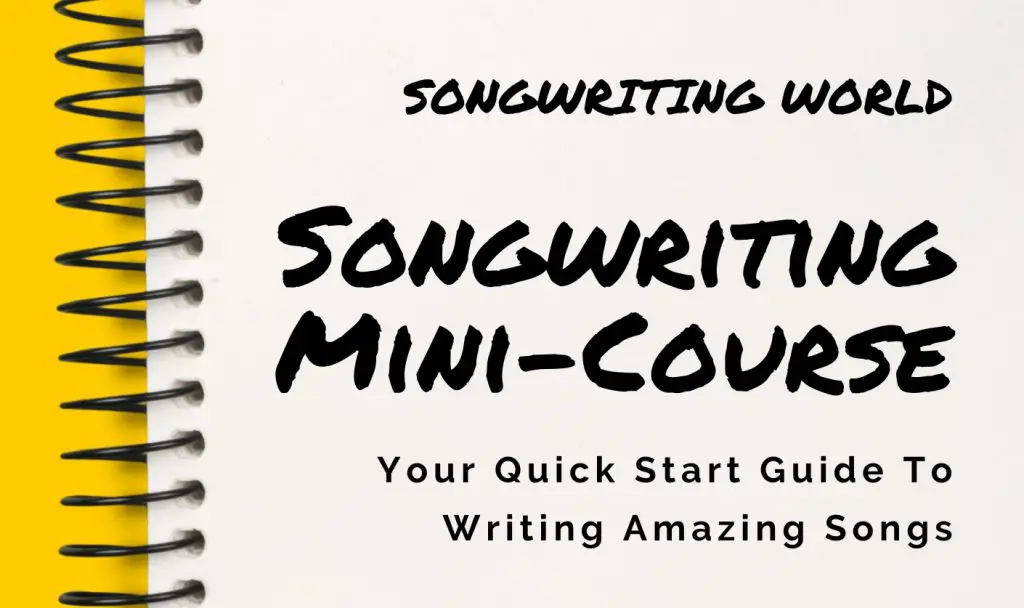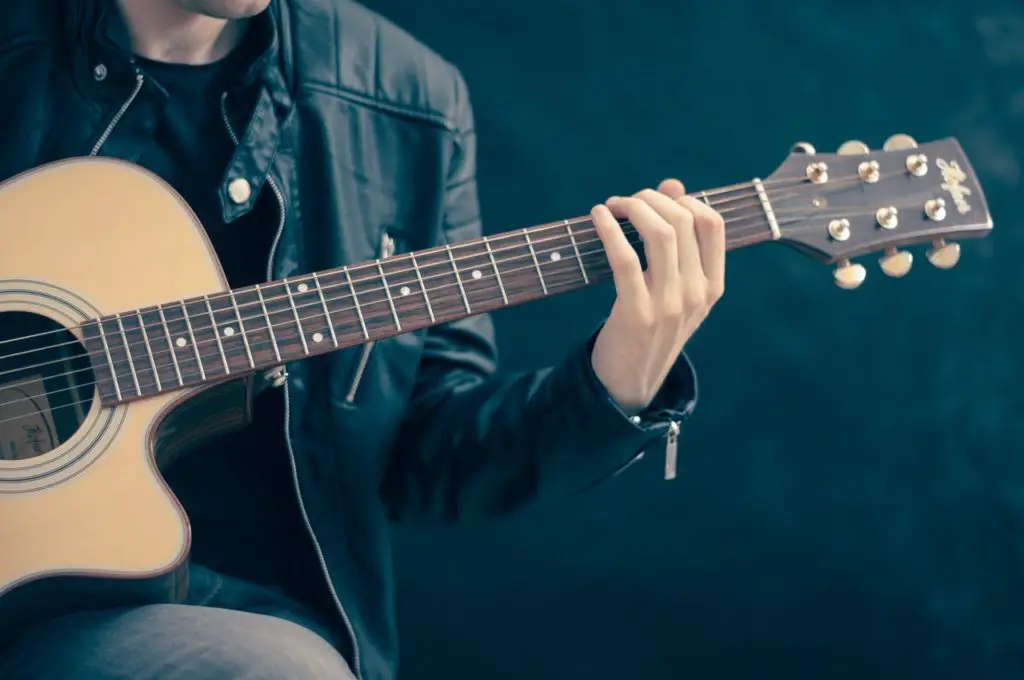
How to finish a song, here’s what you’ll need to overcome: Running out of ideas, lack of inspiration, trouble writing melodies, unsure of what music or lyrics to use together or perfectionism. Finish a song by fixing the part you’re “stuck” on and the rest will come naturally!
One of the biggest challenges for many songwriters is being able to finish a song once it’s been started:
Here’s how it often goes… You have one or two good ideas that you’re excited about.

You play those parts over and over but they just don’t “go anywhere.”
The inspiration that originally struck you is now gone and you’re left with an incomplete piece of music. Uh oh! ?
The best way to overcome these difficulties permanently is to simply write more songs.
After all, these “problems” can lead to unique, innovative, and exciting ideas.. but the only way to discover them is to keep on writing!
Over time you will learn what tricks you need to create more great songs in record time…
However, here’s a handy reference so you can break through your creative blockage right away!
Every creative challenge is an opportunity to grow and learn more about songwriting.
Find Out Where You’re Stuck
Typically there are two places to get stuck: Music or Lyrics
By the time you reach this point you might have:
A really great instrumental part such as a guitar riff or drum beat / rhythm
A Lyric or Chorus that you really like but not much else
You might have one part (lyrics or a melody) but don’t know how to add other parts around it so that the song feels complete.
Another version of this problem is when you have complete sections of a song (like a Verse or a Chorus) but lack the other parts.
For some reason you’re at a loss to complete the other Verses, Bridge, or any of the other parts you’d like to have so that the song feels complete and satisfying.
Here’s how I suggest to fix this problem:
Think of the “bigger picture” of what you’d like the listener of the song to think or feel.
When you know what you’d like to “accomplish” with the song it can unlock more creative energy to finish the other parts of the song.
If you have a melody but nothing else:
When you have a melody you can typically find the primary key that it would work in.
Without getting into too much music theory detail, the melody contains notes that likely already exist within a key.
Find out which notes your melody contains and then which key they can work in. It’s likely your melody is already solidly in a certain key.
If you have chords or want to know which other chords would fit:
If you have some chords for a section you can find what key those chords fit into.
Once you know the key, you can use all the different chords that exist within that key, as well as chords that are not in the key but sound good when contrasted with it.
Once you know the key you can use this to improvise and come up with new melodic, lyrical, and musical ideas.
“Rip off” your favorite songs to inspire inspiration
If you’re really at a loss you can ethically “steal” sections of a song you already know and translate it into your own style.
For example, let’s say you really like the chorus for a song in a completely different genre.
As an experiment, imagine you are rewriting that same chorus except with different lyrics and in a different style.
Making it into a game to rewrite a different song, in a different style, with your lyrics and melody is just a way to take the pressure off having to finish the song and instead focus on being creative instead.
Use placeholder lyrics
Sometimes not all of the parts of the song will fall into place at the same time.
It’s normal to use placeholder lyrics that have the same rhythm and melody that you would like to use later.
A famous example of this is the Beatles song ‘Yesterday’ where Paul McCartney originally wrote the famous opening line as:
Scrambled eggs
Oh my baby how I love your legs
Not as much as I love scrambled eggs
He loved the melody and chords but didn’t quite have the final lyrics yet.
This song might never have happened if he didn’t use placeholder lyrics until the final lyrical inspiration struck.
Change the arrangement and instrumentation
If it’s still just not coming together for you, something you can try is to change the instruments being used.
If you’re writing on guitar, try switching to piano. You could also try playing the bass guitar instead of the acoustic guitar, for example.
Or, you can keep things simple and just change the effect you are using on the guitar. For example, try adding distortion or another effect to your electric guitar to inspire some new ideas.
If you typically play Grand Piano, try switching to an Wurlitzer organ sound and see if that inspires a new direction.
Get out of your comfort zone a bit and release some of the pressure.
Release the pressure and relax
Not everybody performs well under pressure, so if everything you’ve tried hasn’t worked try to relax a bit.
Do what you need to do to get back into a relaxed creative flow such as stretching, eating something healthy, and simply taking care of your body.
People have more energy and are more creative when we take care of our sleep, exercise, and diet.
However, this isn’t an excuse to quit and stop writing. To relax, all you may need is a short walk around the park or even getting some exercise at the gym. You may even try taking a short nap.
Let go of perfectionism and aim to “get it done”
Roy Orbison is a famous songwriter who was very prolific. Hearing his music you might think he was touched by the music gods to deliver hit songs to us mere mortals.
However, Orbison simply “did the work” and reported to the studio to write songs with a typical day job work schedule.
He didn’t wait for “inspiration” to strike, although I’m sure it often did for him. He simply focused on writing and finishing songs. Inevitably many of them went on to be big hits.
If you are being held back by a need for perfection, try letting it go in favor of “finishing the song.”
While the basic song may not sound as amazing as how it was originally imagined in your mind, don’t let this stop you.
There are many things that can be done during the production process to pull out and accentuate many positive qualities that you, as the songwriter, may be missing out on.
It’s also possible that you are too close to the work to realize how special it is.
Many musicians are overly critical of their own work. Don’t let this prevent you from putting your music out into the world.
Ultimately, leave it to the listener to decide if your song is great and instead focus on simply writing more songs.
Improve your technical skills
If you’re having difficulty playing your instrument or if music theory gives you the chills it may be a sign that this is something you can work on separately.
Creativity flows freely when the technical skills required to bring it to life are already in place.
If you would like to write songs on guitar, but aren’t a very good guitar player, then you’ll suffer unnecessarily.
Practice your instrument to be technically proficient. This will allow the creativity to flow out of you more easily when inspiration strikes (or when it’s simply time to write a song.)
If you’re a singer, don’t forget to train your voice separately from the instrument you typically perform with (usually piano or guitar).
Despite all I’ve shared, you might just need to put your song aside into an “incomplete songs” pile and get back to it later.
At the end of the day.. It’s about creativity
The creative and subconscious mind work in mysterious ways. Who knows, you might just be inspired to combine multiple incomplete songs into something new and interesting.
Don’t despair if you can’t finish every single one of your songs in one sitting. Many great songs have been written in unusual circumstances.
Simply keep practicing and keeping up your songwriting practice.
Your creative mind will be trained that when it’s “songwriting time” to unleash all the inspiration you need to write just the songs you’d like to write.
In my opinion, and it’s just my opinion, songs sound best when allowed to spontaneously erupt from within.
No judgement, just following the creative flow wherever it would like to go. Try it, and I think you’d agree.
I hope these songwriting tips will help you finish your songs once and for all. Let me know your thoughts in the comments below!
